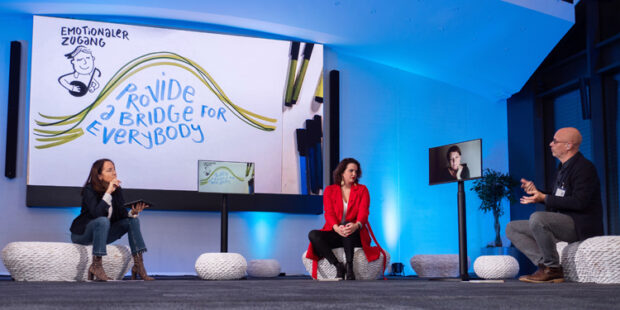Trinity College London launches digital grades and diplomas
Trinity College London is now offering digital grades and diplomas. The new online exams are accessible to teachers and candidates worldwide, allowing candidates to continue taking exams digitally during the pandemic and beyond.
Available via Trinity’s newly upgraded digital system, the exams enable candidates to record pieces and technical work at a place and time of their choice, then submit a video recording for assessment by expert examiners.
Trinity’s latest piano syllabus is included in the new online offering. Featuring more repertoire than ever before plus options for candidates to personlise their exam, Trinity’s Piano Syllabus 2021-23 has been praised by EPTA UK chair Murray McLachlan as ‘extremely comprehensive, flexible and creative’.

Warum Kultur wichtig ist
Wie wird und bleibt klassische Musik relevant? Was bedeutet Relevanz überhaupt? Ist klassische Musik wirklich „systemrelevant“? Diese Fragen scheinen mit dem erneuten Lockdown aktueller und drängender denn je zu sein. Unter dem Motto „Was jetzt?! Auf der Suche nach der Relevanz von morgen“ tagte die Heidelberg Music Conference mit über 200 Teilnehmern, bestehend aus Intendanten, Kulturmanagern, Künstlern, Studenten und Musikjournalisten, erstmals im digitalen Raum. 2013 wurde die Konferenz von Thorsten Schmidt ins Leben gerufen, seither zählt sie zu einem der wichtigsten Treffpunkte der klassischen Musikindustrie.
Was der Klassikbranche fehle, ist vor allem eine gemeinsame Stimme, im Sinne einer gemeinsamen Allianz, meint Schmidt. Das klingt für Kulturjournalistin Christiane Peitz jedoch wie ein Widerspruch, denn es gebe doch Interessenverbände, die zwar nicht unisono sprechen, sich aber im Kern dennoch einig seien. Auch gebe es eine große Solidarität untereinander. Warum also ist das vorhandene „Wir“ trotzdem nicht wahrnehmbar? Möglicherweise, weil diese Stimme beim Zuwendungsgeber und in der Öffentlichkeit schlicht nicht ankommt. „Das ist eine Investition in die Zukunft unserer Gesellschaft. Und Lösungen können nur im Dialog mit der Politik gefunden werden“, so Schmidt.

Why culture is important
How does classical music become and remain relevant? What does relevance mean anyway? Is classical music really “systemically relevant”? With the renewed lockdown, these questions seem more topical and urgent than ever. Under the motto “What now?! In Search of Tomorrow’s Relevance”, the Heidelberg Music Conference with over 200 participants, consisting of artistic directors, cultural managers, artists, students and music journalists, met for the first time in digital space. The conference was initiated by Thorsten Schmidt in 2013 and has since become one of the most important meeting places for the classical music industry.
What the classical music industry lacks above all is a common voice, in the sense of a common alliance, says Schmidt. For culture journalist Christiane Peitz, however, this sounds like a contradiction in terms, because there are interest groups that do not speak in unison, but are nevertheless in agreement at the core. There is also a great deal of solidarity among them. So why is the existing “we” still not perceptible? Possibly because this voice is simply not heard by the funding agencies and the public. “This is an investment in the future of our society. And solutions can only be found in dialogue with politicians,” said Schmidt.
Grace Moore, 12 ans, compositrice pour l’Orchestre Philharmonique de New York
Grace Moore est une jeune adolescente noire née à Brooklyn. Alors qu’elle a 2 ans, sa mère lui achète un piano et son amour pour la musique classique commence. L’adolescente est aujourd’hui membre du programme « Very young composers » (très jeunes compositeurs) de la Philharmonie de New York, un programme qui apprend aux enfants dès 8 ans à créer leur musique.
En raison de la pandémie du coronavirus, les salles de concert sont fermées et l’Orchestre Philharmonique de New York a annulé sa saison 2020-2021. L’institution a donc décidé d’investir les espaces extérieurs, produisant des concerts dans la ville de New York. C’est ainsi que le NY Phil Bandwagon a vu le jour. Il s’agit d’une camionnette de musiciens de l’orchestre qui sillonne la ville de New York et propose des concerts en plein air. Ils ont notamment joué de la musique baroque à Broadway cet automne. Le mois dernier, cet ensemble de musiciens a joué sous le pont de Brooklyn « Summer », pièce écrite par Grace Moore, faisant d’elle une des plus jeunes compositrices de l’institution.

Grace Moore, 12 years old, composer for the New York Philharmonic Orchestra
Grace Moore is a young black teenager born in Brooklyn. When she was 2 years old, her mother bought her a piano and her love for classical music began. The teenager is now a member of the New York Philharmonic’s “Very young composers” program, which teaches children as young as 8 years old how to create their own music.
Due to the coronavirus pandemic, concert halls are closed and the New York Philharmonic has cancelled its 2020-2021 season. The institution has therefore decided to invest in outdoor spaces, producing concerts in New York City. This is how the NY Phil Bandwagon came into being. It is a van of musicians from the orchestra that criss-crosses New York City and offers outdoor concerts. Among other things, they have performed baroque music on Broadway this fall. Last month, the ensemble played “Summer” under the Brooklyn Bridge, a piece written by Grace Moore, making her one of the youngest composers in the institution.
 BACK
BACK